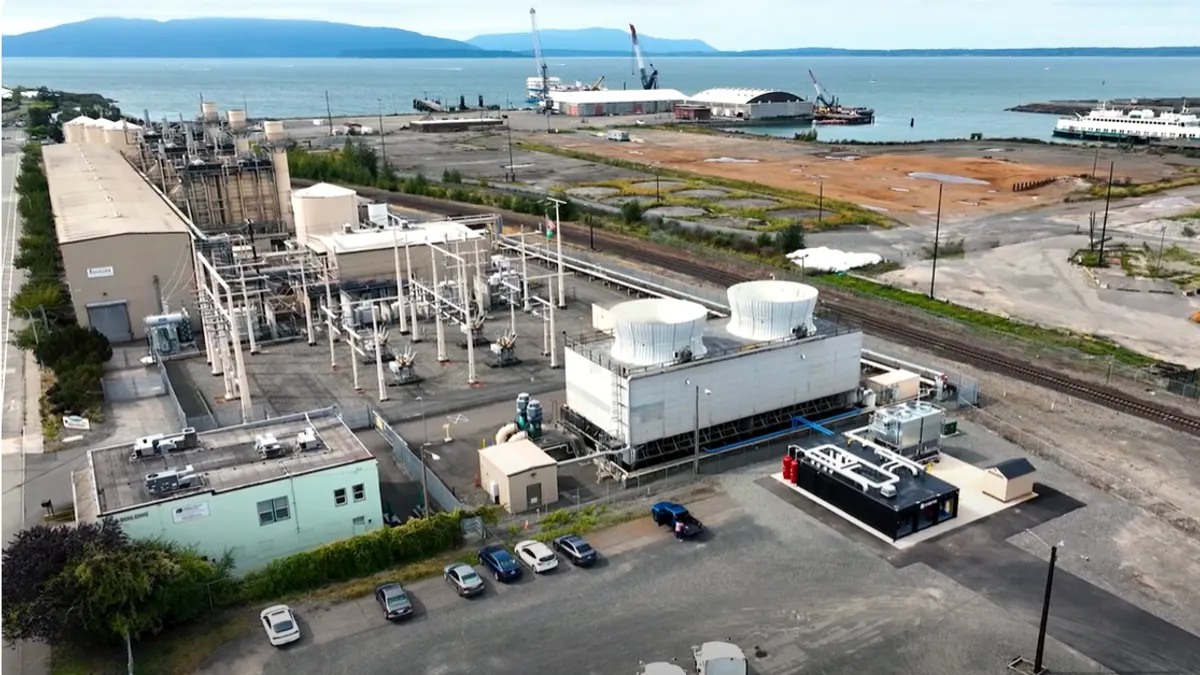Dive Brief:
- Corix DE Systems has launched its district energy system, which initially provides low-carbon heating and cooling to more than 200,000 square feet of buildings in the downtown waterfront district in Bellingham, Washington.
- The Bellingham District Energy Utility captures waste heat from Puget Sound Energy’s Encogen Generating Station, located next door, which it uses to heat and cool and provide hot and cold water for customers’ buildings. The centralized energy plant serves the district’s buildings “more efficiently than individual systems,” according to a news release last week.
- The initiative, developed with the Port of Bellingham, comes after the 2021 Washington State Energy Code approved district energy as a pathway toward energy code compliance. “Notably, the BDEU is the first low-carbon district energy system to achieve the rigorous efficiency and performance criteria” the code requires, Corix said.
Dive Insight:
The Washington State Energy Code, which went into effect for commercial and residential buildings in March 2024, sets energy use benchmarking, energy use intensity target levels and compliance deadlines for different building types in an effort to reduce the state’s greenhouse gas emissions as well as setting requirements for district energy systems.
Building heating and cooling systems account for about 43% of energy use in the U.S., contributing to greenhouse gas emissions due to fossil fuel use, according to the U.S. Environmental Protection Agency. Against that backdrop, more cities and communities are turning to district energy systems, which can use low-carbon energy sources like waste heat to decarbonize buildings without straining the electrical grid, Corix said.
While retrofitting buildings can be challenging and expensive, a district energy system makes it easier to incorporate “rapidly evolving renewable energy technologies,” the Port of Bellingham said.
The BDEU is part of a plan to transform a long-vacant, 18.8 acre site of a former Georgia-Pacific pulp, paper and chemical plant into a “thriving mixed-use community,” Corix said. Currently, its three prefabricated modules have 1.5 megawatts of thermal heating capacity and 380 tons of cooling capacity. The initial phase includes a 280-ton evaporative cooler, natural gas condensing boilers with a thermal capacity of 1.1 MW and a 400-kilowatt thermal heat recovery chiller to boost efficiency by recycling excess heat, according to Corix’s website. Over time, the project will supply heating and cooling to 1.6 million square feet of buildings and avoid 2,400 tons of carbon dioxide equivalent emissions, according to Corix’s website.
In a statement, Chris Clark, the Encogen Generating Station’s supervisor of operations and maintenance, said the facility’s partnership with Corix would not only benefit the Bellingham community, but also support Puget Sound Energy’s pledge to cut carbon emissions.















